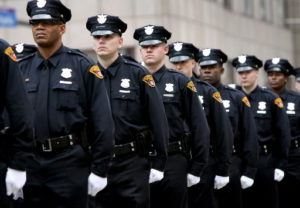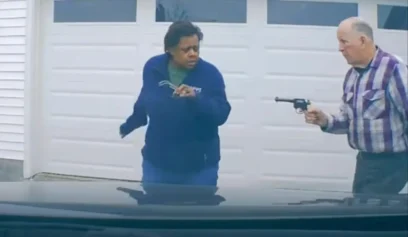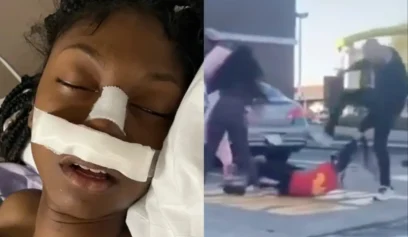
Some commentators have argued that police departments aren’t actually plagued with racism and that the NYPD has no problem with racial profiling, but current and former Black NYPD officers beg to differ.
According to the officers, once their uniforms come off they are no longer excluded from the pool of Black citizens who are racially profiled by the police.
A total of 25 Black NYPD officers, 15 retired and 10 still serving, were interviewed by Reuters and had troubling tales of their own run-ins with their colleagues.
Only one officer said he had never been a victim of racial profiling when he was out of uniform but 24 others said that their badge is essential to keeping them out of trouble—and sometimes even that isn’t enough.
The Black officers revealed that they were often pulled over even though they weren’t committing a crime and five of them said they had guns drawn on them despite the fact that they had done no wrong.
Harold Thomas, a decorated detective who retired after spending three decades on the force, even had his head smashed into the hood of his own car while leaving a nightclub back in 2012.
Thomas said he was dressed in green sweatpants and had on flashy jewelry when he left a friend’s birthday party on that fateful night.
He approached his white Escalade when two officers, both white, approached him.
The details of the case are still being debated but Thomas claims he hadn’t committed any crimes when the officers confronted him.
The officers slammed Thomas’s head into the hood of his car before tossing him down to the ground.
It’s something Thomas said would have never happened if he were white.
He has since filed a lawsuit against the city over the incident.
Then there is the story of Desmond Blaize who did not get into a physical altercation with officers but had a bizarre encounter with them that reminded him of the agency’s racial bias.
Blaize was jogging through the park one day when officers decided a Black man jogging was incredibly suspicious behavior.
The former sergeant in the 41st Precinct in the Bronx said officers stopped him during his jog through an upmarket section of Brooklyn’s Prospect Park.
“I had my ID on me so it didn’t escalate,” he told Reuters. “But what’s suspicious about a jogger? In jogging clothes?”
The problem, according to many academics, is the fact that racism has already created a society that correlates Blackness to criminality.
It’s been proven to be true for Black people as young as 12-year-old Tamir Rice, who was fatally shot by a Cleveland police officer for holding a toy gun, to adults like 43-year-old Eric Garner, who was placed in a NYPD-banned chokehold by officer Daniel Pantaleo.
The very color of their skin was enough for officers to assume they were dangerous.

Retired NYPD detective Harold Thomas poses with his retired NYPD identification card in West Hempstead, New York December 17, 2014
Credit: REUTERS/Shannon Stapleton
This has been the focus of many academic studies, including the 2004 “Seeing Black: Race, Crime and Visual Processing.”
Social psychologists from Stanford and Yale universities and John Jay College of Criminal Justice found that there is an implicit racial bias that plagues American citizens.
Once these citizens get a badge and a license to kill, the result is heart-breaking.
A 2010 New York State Task Force report on police-on-police shootings discovered that officers of color suffered the highest fatalities in encounters with police officers who mistook them for criminals.
Proof, yet again, that many officers will still see Black skin before they consider the blue uniform.
One Black police chief, however, isn’t so sure about the claims of racism inside the force.
“It makes good headlines to say this is occurring but I don’t think you can validate it until you look into the circumstances they were stopped in,” Bernard Parks, the former chief of the Los Angeles Police Department, told Reuters.
Parks believes that the data and statistics officers are provided are the real cause of the disproportionately high amount of Black people being stopped.
“Now if you want to get into the essence of why certain groups are stopped more than others, then you only need to go to the crime reports and see which ethnic groups are listed more as suspects,” he said. “That’s the crime data the officers are living with.”
It’s also crime data that shows Black people make up more than 70 percent of shooting suspects despite only accounting for roughly 23 percent of the population in New York.
Academics believe these numbers still aren’t enough to justify racial profiling.
Studies have suggested that officers make a particular effort to focus on Black communities while ignoring crime in white neighborhoods.
There is also the fact that being a suspect does not make someone guilty of a crime.
The police data shows that more Blacks are being accused of shootings but not necessarily that they are actually found guilty in all those cases.
When it comes down to it, the group of more than two-dozen Black officers say there is definitely a problem with racism in the NYPD.
To make matters worse, officers who want to do something about it are often encouraged to keep their mouths shut.
“There’s no real outlet to report the abuse,” said Brooklyn Borough President Eric Adams, a former NYPD captain who said he was stigmatized and retaliated against throughout his 22-year-career, according to Reuters.
Adams said he always spoke out against abuse and racial profiling and all it did was make his job extremely difficult.
He explained that officers who make complaints through the Internal Affairs Bureau usually have their identities leaked.
When that happens, their uniform is no longer a safety net against the physical, verbal and systemic abuse from other officers.


